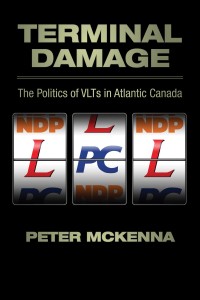- Home
- Books
- Terminal Damage
- Review
Terminal Damage

Terminal Damage
The Politics of VLTs in Atlantic Canada
Taking away only some of the VLTs on the Island won’t be enough to ease the problem of gambling addicts, says a UPEI political studies professor. Video lottery terminals will be reduced by 20 per cent and their sites will be cut in half in Prince Edward Island as part of the province’s new gaming strategy. Peter McKenna said there will still be eight out of 10 VLTs remaining and the problem will still be there. “To fix the problem, the government has to take away all of the VLTs, not just some. If you say you’re concerned about problem gambling and services, eliminate them all together.” The new strategy, Leadership, Integrity, and Responsibility: A Gaming Strategy for Prince Edward Island, outlines the future direction for gaming in P.E.I. Provincial Treasurer Wes Sheridan said he hopes the plan will help people with gambling addictions. “We don’t want anyone out there losing their home because of problem gambling.” Government has a major role to play to ensure this, he added. “Government must show leadership in preventing and reducing the negative impacts of gaming, while ensuring that its benefits are realized for Islanders as fully as possible.” But McKenna said this is just a cosmetic solution. “They want to maintain revenue from VLTs. Cutting the amount of VLTs is not going to help the addiction. People will find them and the addiction will still be there.” McKenna grew up in Halifax and has been around gambling his whole life. He studied problem gambling for 15 years and wrote the book Terminal Damage The politics of VLTs in Atlantic Canada. The government worries about losing revenue, but should instead worry about the people who are being hurt from VLTs, he said. “If you’re serious about curbing the addiction, you don’t get rid of 20 per cent, you get rid of 100 per cent. These are deadly, dangerous machines. People have committed suicide over this problem. My government is supposed to be helping people, not killing them, and that’s what VLTs are doing.” In 1985, provinces were given exclusive control of gaming in Canada. The minister responsible for the PEI Lotteries Commission is responsible for overall leadership, direction, and control of gaming in P.E.I. There are about 195 retailers in communities across the Island licensed to sell lottery tickets and products. There are about 85 places that are licensed to hold and operate about 385 VLTs. This reduction in the number of VLTs will make P.E.I the leader in Atlantic Canada for the lowest number of VLTs per capita, said Sheridan. The plan also includes a new law stating users must be 19 to buy lottery products. Sheridan said there will be fines for people caught selling lottery products to those under 19. He also said government will enhance resources for education, awareness, research and treatment to promote and support responsible gaming. “Public education, awareness and research all play vital roles in preventing problem gaming.” The strategy is planned to be consistently reviewed and updated as needed. “Government will continue to monitor, evaluate and measure the impacts of this strategy as it is implemented, and will take action on findings,” Sheridan said. The entire strategy will be implemented over the next two years, with some measures put in place immediately, he added.

